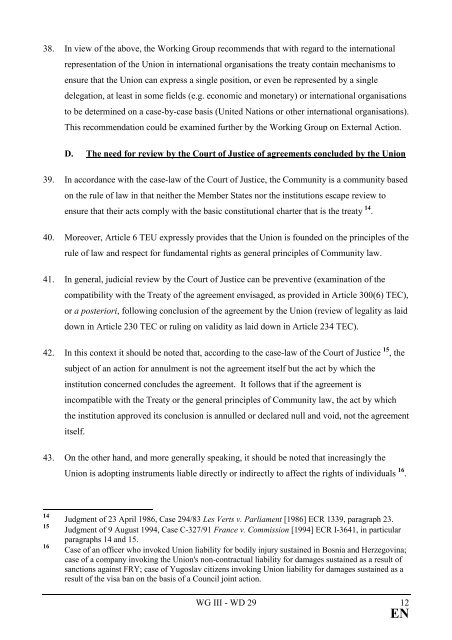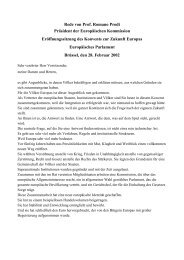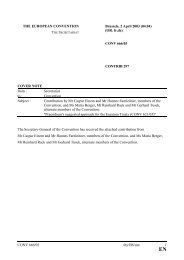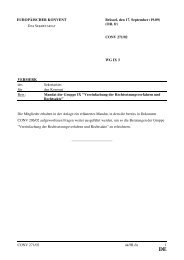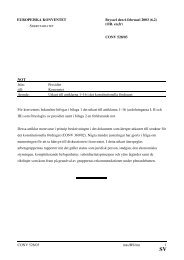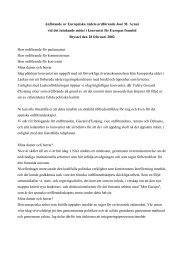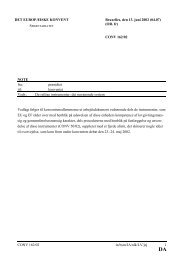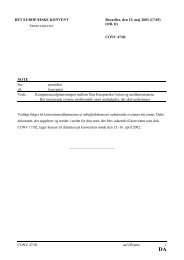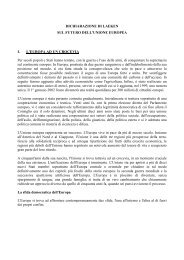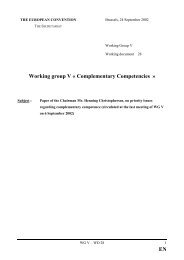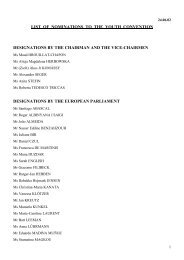WG III - WD 29 1 THE EUROPEAN CONVENTION Brussels, 24 ...
WG III - WD 29 1 THE EUROPEAN CONVENTION Brussels, 24 ...
WG III - WD 29 1 THE EUROPEAN CONVENTION Brussels, 24 ...
You also want an ePaper? Increase the reach of your titles
YUMPU automatically turns print PDFs into web optimized ePapers that Google loves.
38. In view of the above, the Working Group recommends that with regard to the international<br />
representation of the Union in international organisations the treaty contain mechanisms to<br />
ensure that the Union can express a single position, or even be represented by a single<br />
delegation, at least in some fields (e.g. economic and monetary) or international organisations<br />
to be determined on a case-by-case basis (United Nations or other international organisations).<br />
This recommendation could be examined further by the Working Group on External Action.<br />
D. The need for review by the Court of Justice of agreements concluded by the Union<br />
39. In accordance with the case-law of the Court of Justice, the Community is a community based<br />
on the rule of law in that neither the Member States nor the institutions escape review to<br />
ensure that their acts comply with the basic constitutional charter that is the treaty 14 .<br />
40. Moreover, Article 6 TEU expressly provides that the Union is founded on the principles of the<br />
rule of law and respect for fundamental rights as general principles of Community law.<br />
41. In general, judicial review by the Court of Justice can be preventive (examination of the<br />
compatibility with the Treaty of the agreement envisaged, as provided in Article 300(6) TEC),<br />
or a posteriori, following conclusion of the agreement by the Union (review of legality as laid<br />
down in Article 230 TEC or ruling on validity as laid down in Article 234 TEC).<br />
42. In this context it should be noted that, according to the case-law of the Court of Justice 15 , the<br />
subject of an action for annulment is not the agreement itself but the act by which the<br />
institution concerned concludes the agreement. It follows that if the agreement is<br />
incompatible with the Treaty or the general principles of Community law, the act by which<br />
the institution approved its conclusion is annulled or declared null and void, not the agreement<br />
itself.<br />
43. On the other hand, and more generally speaking, it should be noted that increasingly the<br />
Union is adopting instruments liable directly or indirectly to affect the rights of individuals 16 .<br />
14<br />
Judgment of 23 April 1986, Case <strong>29</strong>4/83 Les Verts v. Parliament [1986] ECR 1339, paragraph 23.<br />
15<br />
Judgment of 9 August 1994, Case C-327/91 France v. Commission [1994] ECR I-3641, in particular<br />
paragraphs 14 and 15.<br />
16<br />
Case of an officer who invoked Union liability for bodily injury sustained in Bosnia and Herzegovina;<br />
case of a company invoking the Union's non-contractual liability for damages sustained as a result of<br />
sanctions against FRY; case of Yugoslav citizens invoking Union liability for damages sustained as a<br />
result of the visa ban on the basis of a Council joint action.<br />
<strong>WG</strong> <strong>III</strong> - <strong>WD</strong> <strong>29</strong> 12<br />
EN


